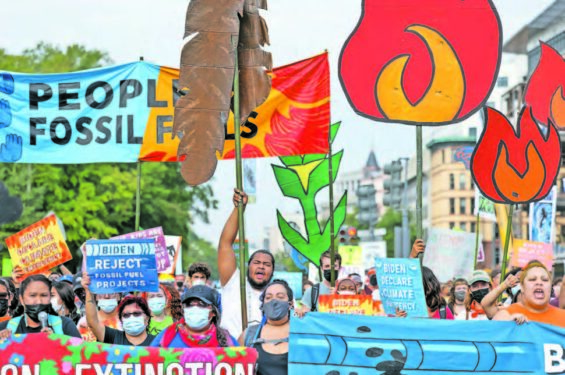
PROSPECT HEIGHTS — On the campaign trail, President Joe Biden was steadfast in his commitment to environmental policy. And so far through his first term, Catholic environmental advocates say he has by and large kept that commitment.
“This is a very political issue, so given the constraints they’ve had to work with, I think they’re doing a great job,” Indu Spungnardi, the Catholic Health Association director of advocacy and resource development with a focus on environmental health, told The Tablet.
Beyond policy actions, Jose Aguto noted that there’s also significance to the simple fact that the Biden administration has kept environmental policy at the forefront.
“[The Biden administration] essentially elevated environmental justice, which has been a boutique and ignored issue emanating from the 1980s into mainstream awareness,” Aguto, the executive director of the Catholic Climate Covenant, told The Tablet.
One of Biden’s first actions when he took office was enacting the Justice40 Initiative. The initiative is an executive action that forces federal agencies to adopt a more environmental lens in their work, which Spungnardi said is important because “you can’t silo this work.”
Biden over the past two years has also established a White House environmental task force, taken steps to bolster the nation’s efforts to reach net-zero emissions by 2050, and committed to fund community resiliency efforts to combat climate change and to allow rural communities to transition to renewable energy. He’s placed an emphasis on creating green jobs, as well. He also rejoined the Paris Climate Agreement — an international treaty on climate change.
“These are massively significant at the administrative level,” Spugnardi said.
Just last week, the administration proposed new carbon pollution standards to restrict greenhouse gas emissions released by fossil fuel-fired power plants. The proposal, however, was rejected by Republican lawmakers in Republican-predominant states, who threatened legal action.
Republican lawmakers have often rebuked Biden’s climate actions for the high price tags they come with, and the potential negative impacts they could have on jobs. So far, Biden has committed in excess of $100 billion to climate initiatives.
That said, the most significant environmental policies from the Biden administration came via the Inflation Reduction Act, legislation that Congress passed and the president signed last summer.
Spugnardi called the legislation “groundbreaking,” particularly for the tax incentives it includes for corporations that adopt more renewable energies. She noted that the act allows not-for-profits to leverage those incentives, whereas before they needed a tax liability.
“They’ve made it so dioceses, parishes, religious orders — all of these tax-exempt organizations — can now leverage these tax incentives to retrofit their organizations so that they can become more energy efficient and use renewable energy sources, which is great,” Spugnardi said.
The Inflation Reduction Act — which came with a $1.2 trillion price tag — also established a “green bank,” allocating $27 billion to help communities transition to clean energy and combat climate change.
“The Inflation Reduction Act is the first ever significant national federal climate legislation, which pivots our nation to have a national commitment to addressing climate change,” Aguto said, highlighting that the bipartisan Infrastructure Investment and Jobs Act and the CHIPS and Science Act passed last year also contain funding for like-minded initiatives.
The consensus of those The Tablet spoke to was that the Biden administration has delivered on its environmental policy promises. Laura Anderko, a Villanova University environmental health nurse consultant, even said Biden has “done more than any other president in the area of climate change.” However, that doesn’t mean that there isn’t more that advocates say must happen, or that there haven’t been missteps along the way.
One of those missteps, according to the advocates The Tablet spoke with, is the Willow Project — an administration-approved oil drilling project in northern Alaska. Spugnardi and Aguto both said that while they don’t agree with the project, they understand that in the current political climate some concessions have to be made to further the overall agenda.
Anderko said the project’s approval is a broken promise that should be rethought.
“It is clearly linked to climate policy and destroying the environment in big ways, and so where he has environmentalists behind him, it is a huge misstep,” Anderko said. “You can’t be investing in renewable energy and then be investing in something that’s going to destroy the environment and continue to drain natural resources from our environments.”
Aguto said that while the Biden administration has taken important steps on environmental policy in the U.S., he would like to see the administration have more of a voice on the international level, especially in supporting developing nations with climate resilience.
“It’s important to continue to find creative ways to have climate finance flow to developing nations that help them build their climate resilience,” Aguto said.
Spugnardi, meanwhile, said it’s crucial that Biden not sacrifice any climate provisions as part of the ongoing debt ceiling negotiations, which the Catholic Health Association expressed in a letter to the administration earlier this month.
Beyond that, she wants the administration to keep in mind as it implements new environmental policies that it can’t be on one industry alone to make changes.
“For any industry to embrace fully going to renewable energies, other parts of the sector have to transition as well, so we just want to make sure that no one industry is bearing the burden of that,” Spugnardi said. “Everyone needs to be asked equally to make that commitment.”
This is the third piece in a series about issues President Joe Biden stressed when he ran for office two years ago and where things stand today. Subsequent stories will look at abortion and unity.
